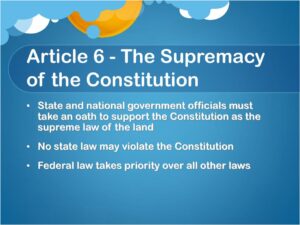Back to: Religion and National Value JSS 3
Welcome to class!
In today’s class, we’re going to be talking about the Implications of supremacy of the constitution for states and Individuals. I trust you will enjoy the class!
Implications of Supremacy of the Constitution for States and Individuals
1. What is the Supremacy of the Constitution?
The supremacy of the constitution refers to the idea that the constitution is the highest law of the land. It takes precedence over all other laws, regulations, and government actions. In Nigeria, the 1999 Constitution (as amended) serves as the supreme legal document.

2. Implications for States:
- State Laws Must Align with the Constitution
– State governments must ensure that their laws, policies, and actions are consistent with the provisions of the national constitution.
– For example, if a state law contradicts a constitutional provision (e.g., freedom of speech), the constitution prevails, and the state law becomes invalid.
- State Autonomy within Constitutional Limits
– While states have some autonomy, they cannot violate fundamental constitutional principles.
– For instance, states can create their educational policies, but these policies must not infringe upon the right to education guaranteed by the constitution.
2. State Courts and the Constitution

– State courts play a crucial role in interpreting and applying constitutional provisions.
– If a state law is challenged, state courts must assess its compatibility with the constitution.
3. Implications for Individuals:
- Fundamental Rights and Freedoms
– The constitution guarantees fundamental rights and freedoms to individuals, such as the right to life, liberty, and dignity.
– Citizens can seek legal redress if their rights are violated by any authority, including state governments.
- Duties and Responsibilities

– Individuals have a duty to uphold the constitution and respect its provisions.
– For example, citizens must pay taxes, obey laws, and participate in democratic processes.
- Legal Protection
– The constitution provides a legal framework for resolving disputes and protecting citizens’ rights.
– If an individual’s rights are violated, they can approach the courts for justice.
4. Examples:
- Example of State Law vs. Constitution:
– Imagine a state law that restricts freedom of religion by prohibiting certain religious practices. If challenged, the court would assess whether this law violates the constitutional right to freedom of religion.
- Example of Individual Rights:
– A citizen who believes their property rights are violated by a state government’s land acquisition can seek legal recourse based on constitutional protections.
Understanding the implications of the supremacy of the constitution empowers both states and individuals. It ensures a harmonious legal system and protects citizens’ rights. Remember, the constitution is our compass for justice and equality!
We have come to the end of today’s class. I hope you enjoyed the class!
In the next class, we shall be discussing National Values: Right Attitude to Work.
In case you require further assistance or have any questions, feel free to ask in the comment section below, and trust us to respond as soon as possible. Cheers!
